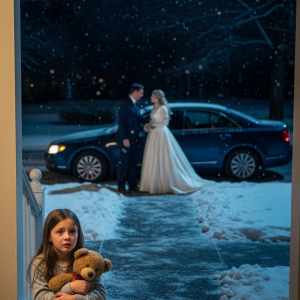My name is Maya. I’m twenty-four now, but this story begins two years ago, with a man I thought I would marry and a sister I thought I knew.
His name was Jake. We met in college, and the connection was immediate—one of those easy, comfortable loves built on shared jokes and late-night conversations. He was thoughtful, he was kind, and after a year, I was ready for him to meet my family. This, I knew, would be the real test. My family is… traditional. We come from a conservative culture where appearances are everything and unspoken rules are ironclad.
They were polite to Jake, but a chilling frostiness settled over the dinner table. My parents offered him smiles that never reached their eyes, their questions about his career and intentions laced with subtle judgment. It was the look they exchanged when they thought I wasn’t watching that told me everything: “Are you sure about this one?”
I brushed it off. They’d come around. But while my parents were a wall of ice, my sisters, Grace and Emma, were the opposite. Emma, only eleven, was instantly charmed by him. And Grace, my twenty-two-year-old sister, seemed to adore him. They’d laugh at inside jokes I wasn’t privy to, and I’d tease her, “Careful, you’re going to steal my boyfriend.” It was a joke. A stupid, naive joke.
Because we weren’t married, Jake and I lived in different cities, a fact my parents approved of. Our relationship was built on weekend visits and absolute trust. I trusted him. I trusted my sister. They were the two constants in my life. What could possibly go wrong?
Three months after that first meeting, I found out.
I was at Jake’s apartment for the weekend. It was an ordinary Saturday. We’d gotten takeout, watched a movie. The mundane comfort of it all was a lie. He stepped into the shower, and his phone, lying on the nightstand, began to vibrate. It buzzed once, then again, insistently. I’m not a snooper. Trust, to me, was the foundation of everything. But a knot of pure dread tightened in my stomach. Something was wrong.
I picked it up. The screen lit up with a notification. A message from Grace.
My first thought was relief. She’s just my sister. But when I unlocked the phone, that relief curdled into horror. I opened the chat, and the world tilted on its axis.
“Can’t stop thinking about last time. When can I see you again?”
My breath hitched. My fingers, trembling, scrolled up. It wasn’t one message. It was an avalanche. Months of them. Secret conversations that stretched late into the night. Flirtatious, intimate messages planning meetups they’d hidden from me. There were photos—pictures of them together I had never seen, smiling in a way that felt like a knife twisting in my gut. I felt the bile rise in my throat. The person I loved and the sister I had practically raised—our parents were always too absorbed in their own world—had been betraying me for months.
My hands shook so violently I could barely operate the phone. I took screenshots of everything, a cold, methodical rage taking over. I sent them to myself, grabbed my purse, and walked out of his apartment without a sound. I didn’t wait for him to finish his shower. I didn’t give him the satisfaction of a confrontation, of hearing his excuses. I just vanished from his life.
The calls and texts started before I even reached my car. A flood of “Where are you?” and “Baby, what’s wrong?” I ignored them. I drove home in a haze of silent fury, the screenshots burning a hole in my phone. Once I was safely inside my own apartment, I did two things. First, I sent the entire collection of screenshots to our shared group chat with our college friends. Then, I blocked his number. Let the world see him for what he was.
But Jake’s betrayal, as sharp as it was, was a shallow cut compared to the wound Grace had inflicted. She was my other half. We’d navigated the minefield of our parents’ neglect together. We were supposed to be a team.
The next morning, I booked a flight home. I didn’t call ahead. I walked into my parents’ house and found Grace sitting at the kitchen table, scrolling through her phone as if nothing had happened. My parents were there, sipping their morning coffee. The domestic tranquility was obscene.
I didn’t speak. I slammed my phone down on the table, the screen lit up with her messages to Jake. The sound echoed in the silent room.
Grace glanced at the screen, a flicker of something—annoyance, not guilt—crossing her face. She looked up at me, her expression utterly devoid of remorse. “Yeah?” she said, her voice laced with a defiant shrug. “I did it. So what?”
So what? The casual cruelty of it shattered something inside me. Before I could react, my mother moved. Her hand flew across the table and connected with Grace’s cheek in a slap that cracked through the silence. I had never, ever seen my mother raise a hand to either of us. My father, his face purple with rage, shot to his feet. “Get out!” he roared at Grace. “You have one week to pack your things and get out of my house!”
For a moment, I thought it was over. I thought there had been a reckoning.
Two days later, Grace dropped the bomb that would change everything. She was pregnant. And the baby was Jake’s.
The righteous anger vanished from my parents’ eyes, replaced instantly by a misguided sense of duty. The scandal of a grandchild born out of wedlock was a far greater concern than the betrayal I had suffered. Suddenly, Grace wasn’t a backstabber; she was a damsel in distress. My mother’s tone softened. “We can’t abandon her now,” she’d said, not even looking at me. “She’s carrying our grandchild. Family has to stick together.”
That’s when I broke. “Family?” I laughed, a harsh, broken sound. “You’re choosing her after what she did? You’re enabling this, all of it, just to save face!”
They told me to calm down, that I was overreacting. But I was done. I packed my bag, looked my mother and father in the eye, and said, “Don’t ever contact me again.” I left without a backward glance, blocking their numbers before my plane even took off. The only line I kept open was to Emma. She was an innocent bystander in this war zone.
Two weeks later, a wedding invitation arrived, forwarded by a cousin. Grace and Jake. My mother, using a new number, sent a follow-up text: “It is important for the family to present a united front.”
I blocked that number, too. The real mess, I was about to discover, had only just begun.
For months, the only news I got came in quiet, worried texts from Emma. I learned my parents were throwing Grace a lavish baby shower. Worse, they were spinning a new narrative to our extended family and their social circle: I was the unstable, selfish daughter who had abandoned them in their time of need. Grace, in this twisted fairy tale, was the dutiful daughter trying to hold the family together.
The hypocrisy was breathtaking. My mother was apparently telling anyone who would listen that I needed to hurry up and get married, terrified of the gossip that her younger daughter had beaten me to the altar. My life was being reduced to a chess piece in her game of social reputation.
I ignored Grace’s wedding. I ignored the birth of her child. I threw myself into my career, building a life hundreds of miles away from their poison. For a while, there was silence. Blessed, peaceful silence.
Then, one night, Emma called, her voice choked with tears. “It’s Dad,” she sobbed. “He’s gone.”
A heart attack. He’d been sick for months with heart problems, but they had never told me. My mother, Emma explained, “didn’t want to stress me out.” They had denied me the right to say goodbye to my own father.
I flew home that night, numb with a grief I couldn’t process. When I walked into that house, it was like stepping onto a battlefield. My mother and Grace didn’t greet me with a hug; they greeted me with accusations.
“So, you finally show up,” Grace sneered, her husband Jake standing silently behind her. “Couldn’t wait to get your hands on the money, could you?”
The will reading was a spectacle of pure greed. The air was thick with tension. The lawyer cleared his throat and began. My mother received 20%. Emma, 30%. Grace… 10%.
And me? I was left the largest share. 40% of his entire estate.
The room exploded. Grace and Jake were on their feet, shouting that it was a mistake, that I didn’t deserve a penny. “She needs it more than you!” Jake yelled, pointing at Grace’s stomach. “She has a family! What do you have?” They threatened to sue, to contest the will, to drag my name through the mud.
Later, the lawyer pulled me aside. “Your father left this for you,” he said, handing me a sealed envelope. Inside was a short letter. In his familiar, shaky handwriting, he apologized. He wrote that he knew he should have defended me, that he was ashamed of his silence, but that he had felt trapped by my mother’s obsession with appearances. “I regret how we left things more than you will ever know,” he wrote. The words were a bittersweet poison, closure arriving far too late.
The threats began the next day. Anonymous texts calling me a greedy monster. Then, I found all four of my rental car’s tires slashed in the hotel parking lot. A few days after that, a man started appearing in the hotel lobby, just watching me. He never approached, but his presence was a constant, chilling weight on my shoulders.
I filed for a restraining order against Jake. In court, he painted me as a bitter, vengeoric woman, but the judge saw through it. The order was granted. I thought, naively, that it would be enough.
Then came the website. A meticulously crafted page of slander, filled with distorted truths and outright lies, painting me as a heartless villain who had torn a happy family apart. They even used photos of me from the funeral, captioning them with comments about my cold demeanor.
The final straw came in a plain brown package delivered to my hotel. Inside was a worn, spiral-bound notebook. It was a surveillance log. Pages upon pages detailed my movements for the past several weeks—the cafes I visited, the times I met with Emma, the hours I spent at the lawyer’s office. Someone had been following me, documenting my entire life. It was a calculated act of psychological terror.
That night, I saw the man in the lobby again. This time, I didn’t hesitate. I called the police from my room.
When my lawyer called the next day, his voice was grim. “They arrested him,” he said. “Jake. They caught him trying to break into your old room at the hotel last night.”
It’s been a few months since then. Jake is facing a slew of charges, from stalking to breaking and entering. The restraining order is permanent. I moved into a new apartment, its location a secret known only to Emma and my lawyer. I still speak to my mother occasionally, but her conversations are strained, filled with pleas for me to “forgive and forget” for the sake of the family. She will never understand that she, Grace, and Jake broke that family long ago.
I look back on the woman I was—the trusting girl who believed in love and loyalty above all else. She’s gone. In her place is someone stronger, someone forged in the fires of betrayal and grief. I won the battle for my inheritance, but I carry the scars of the war. They can’t hurt me anymore, but the silence where a family used to be is a haunting reminder of everything I lost, and everything I had to become to survive.
They can’t hurt me anymore, but the silence where a family used to be is a haunting reminder of everything I lost, and everything I had to become to survive.
A few weeks after Jake’s arrest, I started sleeping again. Real sleep. The kind where your mind stops rehearsing conversations and preparing defenses. The police had impounded his laptop and found dozens of folders: photos of me, clips from my social media, messages he’d drafted and never sent. It was chilling, a complete portrait of obsession.
Despite everything, I kept working. My team at the firm was discreet but supportive. I didn’t explain the whole story, just that I was dealing with a “domestic situation.” No one pried. My boss quietly shifted high-visibility accounts my way, and a few weeks later, I earned a promotion.
Emma called one night while I was assembling furniture for the new apartment. “He pled not guilty,” she said. “They’re going to try to get him off on diminished capacity.”
I tightened the last bolt on the bookshelf, the wrench shaking in my hand. “Of course he is. Let me guess—they’ll paint him as the victim again? The poor man driven mad by rejection.”
Emma was silent for a long time. Then she whispered, “Mom says it’s your fault.”
I closed my eyes. Of course she does.
“She says if you had forgiven him, if you hadn’t fought back… none of this would’ve happened.”
I sat back against the wall. “Emma, listen to me. You don’t believe that, do you?”
“No,” she said quickly. “No, I just… I don’t know what to believe anymore. Grace is trying to convince Mom to help Jake’s legal team. Can you believe that?”
“I can,” I said flatly. “I can believe every bit of it.”
Emma came to visit two weekends later. She stood on the threshold of my apartment and burst into tears the second I opened the door. I held her as she sobbed into my shoulder.
“They say I’m betraying the family by talking to you,” she cried. “But you’re the only one who’s ever been honest with me. Everyone else is pretending like nothing happened.”
That was the beginning of something new. Emma started coming every few weekends. We’d cook together, walk the city, talk about school and her plans for the future. She wanted to be a social worker. “I want to help people who don’t have anyone,” she said one night over pasta. “Like you were.”
I smiled. “Like I was, but not anymore.”
The trial date was set for six months later. In the weeks leading up, I received subpoenas, warnings, prep calls from the DA’s office. I was dreading the testimony, but I also knew I needed it.
The day I took the stand, Jake wouldn’t look at me. He sat there in a gray suit that couldn’t hide the darkness in his eyes. His lawyer asked the expected questions—implying I had led him on, that I had known about the affair, that I had exaggerated the danger.
But I answered everything clearly. Calmly. I refused to let them twist my story.
Then it was the DA’s turn. “Ms. Patel,” she said gently, “what do you hope comes from this trial?”
I looked directly at Jake. “I want my life back,” I said. “And I want to make sure he never has the chance to do this to anyone else.”
The jury took two days. He was found guilty on multiple counts—stalking, harassment, attempted unlawful entry. Sentenced to five years.
I didn’t cry. Not at the verdict. Not even when he was taken away.
That night, I stood in front of the mirror and stared at the woman I’d become. Stronger. Harder. Still standing.
The media caught wind of the case. Local outlets reached out, but I refused interviews. This wasn’t a story. This was my life.
One day, Emma handed me a letter. “It’s from Grace,” she said. “She asked me to give it to you. I haven’t read it.”
I stared at the envelope for a long time. Finally, I opened it.
The handwriting was neat, rehearsed. Grace’s tone was oddly formal:
“I know you’ll never forgive me, and I’m not asking you to. I just wanted to say I didn’t plan to fall for him. It just happened. That doesn’t excuse it. But I wanted you to know that I was broken too. I always lived in your shadow, and when Jake paid attention to me, I felt seen. For the first time. It wasn’t about love. It was about desperation.”
She ended it with: “I’m sorry. I’m sorry for the pain. I’m sorry for the betrayal. I’m sorry I wasn’t better.”
I folded the letter. I didn’t burn it. I didn’t respond. I simply filed it away.
Forgiveness is a journey I might never finish. But closure? That I can have.
Last week, I hosted a dinner. Just a few close friends, Emma, my coworkers. Laughter filled my apartment. Someone toasted: “To strength.”
I raised my glass. “To survival. And to starting over.”
Because I had survived. Not just Jake. Not just Grace. Not just my mother. I had survived being forgotten, dismissed, and used. And I was still here.
That’s the truth I carry now: You don’t owe anyone your peace. You fight for it. And you protect it like it’s your life. Because sometimes—it is.




